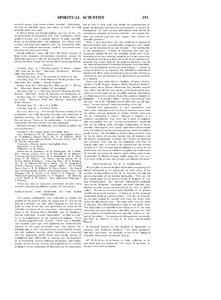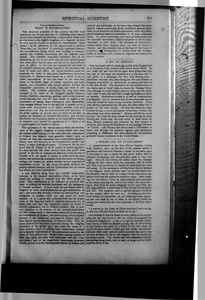< A Budget of Ancient Dreams (continued from page 3-194) >
regained its hold upon him before his comrade reappeared, covered with wounds, and besought him, as he had neglected to save his life, at least not to refuse to avenge his death; he had been murdered by the landlord, and his corpse was at that moment being carried out to the city gate under a cartload of dung. Thinking that this second vision must be some thing more than imagination, the Arcadian ran to the gate found the cart he had seen in his dreams, and succeeded in bringing the villainous innkeeper to condign punishment.
Explaining the Obscure by the More Obscure
The ancient philosopher who undertook to explain the position of the earth in space, by saying that it “rests on the back of a tortoise,” has been often laughed at; but he was quite as wise in his day and generation, as many of the scientific smatterers of our own times. Conspicuous among these is Mr. Francis Gerry Fairfield, who, in Appleton’s journal, undertakes to make Spiritualism “as clear as mud,” to us by explaining it as the outcome of epilepsy. There is nothing original in this surmise. There was a Fairfield, two hundred years ago, who explained the witchcraft phenomena in the same convenient way. The present Mr. Fairfield tells us that “the phenomena are invariably associated with epileptic neurosis, either hereditary or acquired; that the apparently occult forces and strange sources of intelligence often illustrated at seances, are the exponents of an environing nervous influence, consequent upon degeneration of the nervous centres, and engendered in a manner analogous to the production of electricity by the decomposition of tine In nitric acid; that, finally, the predisposition to accept the doctrines and tenets of Spiritualism, is one of the consequences of such nervous disturbance, and should be treated as a symptom of nervous disorder; not argued with after the manner that one man argues with another on scientific questions.”
What a very convenient way this would be to dispose of all inconvenient and uncomfortable antagonists who would show up the absurdity of our pet theories! The remedy lies at the apothecary’s. Instead of reasoning with such presumptuous people, all that Mr. Fairfield would have to do, according to his own showing, would be just to get some drug or compound, and force it down the throat of any refractory individual who makes light of the profound discovery, that all the spiritual phenomena, including levitation and materialization, may be explained by the one word epilepsy! Instead of trying to confute us by argument, Mr. Fairfield is evidently of opinion that all he need condescend to do, in order to bring us round to his way of thinking, is to administerto usa cathartic or a sedative.
Come and give heed, Messrs. Wallace, Crookes, Corson, Anthony, Tuttle, Wagner, Sargent, Olcott, Buchanan, Roberts, Flammarion, Favre, Fichte, Wetherbee, Gay. Peebles, and the rest,—learn that all that you require, to be disabused of your theory as to the origin of the so-called spiritual phenomena, is a little dose of nnx vomica, Pulsatilla, calomel, rhubarb, or belladonna! It is merely a slight “nervous disturbance” that ails you. Go to Dr. Fairfield, and he will make you all right. Your “nervous centres” need overhauling—that’s all.
Comical and preposterous as such speculations may seem, when subjected to the scrutiny of common sense, there are editors who are disposed to wonder whether there may not be “something in them.” Because a medium, or a medium's grandfather, may have had a touch of epilepsy, does that explain why his “nervous environment” should lift him to the ceiling, write messages independent of touch, manifest clairvoyance, and create spirit-forms disconnected, from the medium's person, and doing things which the medium could not do? Mr. Fairfield, in the first place, assumes what he has no means of proving, namely, that all mediums, and all persons predisposed to accept the “tenets" of Spiritualism (whatever they may bet, are epileptics, and then he quietly calls upon us to take it for granted that the tortoise explains all, that having assigned epilepsy as a cause of the phenomena, that cause is sufficient to explain the whole series of marvels—movement of objects, spirit-writing, spirit-music, introduction of flowers through sealed doors, etc., etc, etc.! Is it worth while to treat with gravity such flagrant nonsense?
What is Materialism?
The advanced scientists of the present day who have abandoned the old and easy way of explaining every obscure physical phenomenon by asserting a supernatural cause (such as vital force in the organic kingdom, or a separate creation for each species of plant or animal) are denominated “materialists” by the adherents of the supernatural or spiritual. Those who use this word so profusely, confound, however, two very different things, which have nothing in common; namely, the scientific materialism and the immoral materialism. The scientific materialist maintains that all the phenomena we see on our earth take place by natural means, that every effect has its cause, and that every cause will produce its effect. In his view, law regulates the sum total of all physical phenomena, which depend on the necessary relations of cause and effect. He rejects therefore, most emphatically, the belief in miraculous interferences, and every conception, of whatever form, based on a belief in the so-called supernatural. In his view, there do not exist, any where in the whole range of human cognition, real metaphysics, but everywhere only natural physics for him, the inseparable connection of matter, form, and force is self- evident. This scientific materialism has long since been accepted in the realm of the inorganic natural sciences, physics, chemistry, mineralogy, geology, and no one, however poorly educated, has now the least doubt in regard to the correctness of basing these sciences on such materialism. Only savages believe now in the spirit of a cataract or of a storm, some supernatural power which presides over such phenomena; and this can arise but from utter ignorance of the whole system of natural laws, by which we are able to explain the existence of cataracts and storms; and not only this, but we can at present, thanks to our materialistic system, of research, even predict the appearance of a storm, so as to guard against its disastrous effects.
This ignorance of the natural laws on which the development of the organic kingdom is based—which laws form the science called biology—is the cause that this department of Science has hitherto been generally looked upon as beyond all laws, and dependent upon supernatural agencies. Hence came the invention of the metaphysical spook “vital force,” a mere theological dogma. If, however, we can now prove that all Nature, as far as subject to human cognition, is a unit, and that the same eternal, stern, and grand laws prevail in the life of animals and plants as in the growth of crystals or in the power of steam, we shall reach the same natural and mechanical standpoint in all the realms of biology, zoology, and botany, no matter whether we are suspected of materialism or not. In this sense, the whole realm of the positive natural sciences, and the fundamental laws of causes and effects, are pure “materialism.”
A very different thing from this scientific materialism, however, is the immoral materialism, which, as we have stated, has nothing in common with the other, except its name. This materialism, in its influence on practical life, leads to nothing but material enjoyment and the indulgence of sensual passions. It lives under the sad illusion that indulgence to mere natural pleasures can give satisfaction to man; and under this allusion, it drives its votaries from one indulgence to another, while rest and peace are never reached. It is a grand and profound truth that the proper value of life does not reside in material enjoyment, but in moral acts, and that true happiness cannot be found in exterior appearance, but in virtuous conduct; this is, however, unknown to the votaries of the immoral, materialism. For this reason, such a materialism cannot be found among the investigators of Nature; and philosophers, whose highest pleasure is the intellectual enjoyment of Nature, have for their highest aim the knowledge of Nature's laws. This immoral materialism was found especially among the religious pretenders of the middle ages, who, under the mask of a pious exterior, aimed at nothing but a hierarchical tyranny and a material exploitation of the possessions earned by the labors of their fellow men. Blind to the supreme nobility of what they called, and what their successors still call, “common matter,” and to the magnificent phenomena produced thereby, as well as to the Inexhaustible charms of Nature, and without any knowledge of her laws, they treated the whole field of natural science and all the civilization derived therefrom, as an heretical and sinful materialism; while they themselves practised immoral materialism in its most abhorrent forms. To avoid confounding such immoral materialism with the scientific materialism, Haeckel proposes to call the latter “monism,” or (with Kant) “the principle of mechanism,” without which, Kant declares, there can exist no science of Nature; and this principle lays at the base of the theory of evolution, and distinguishes it forcibly from the theologic belief in miracles, or in a series of separate and supernatual acts of creation.
Editor's notes
Sources
-
Spiritual Scientist, v. 2, No. 25, August 26, 1875, p.291
-
Spiritual Scientist, v. 5, No. 6, October 12, 1876, p.65


